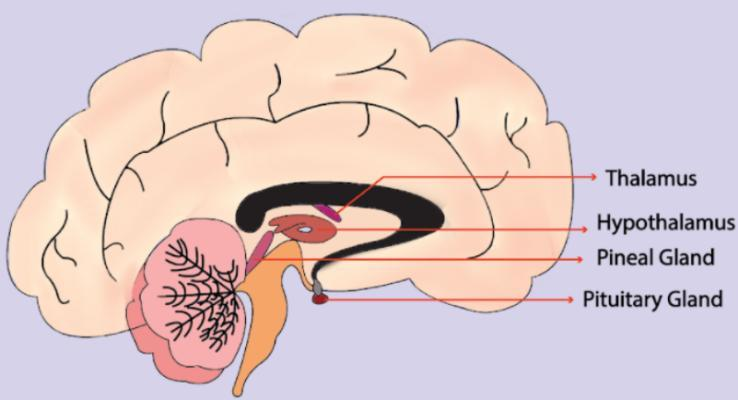
The pineal gland produces
(a) Glucagon
(b) Aldosterone
(c) Cortisone
(d) Melatonin
Answer
504.3k+ views
Hint: This is a hormone that your brain produces in response to darkness. It helps with the timing of your circadian rhythms (24-hour internal clock) and with sleep, can be used to treat delayed sleep phase and circadian rhythm sleep disorders in the blind, and provide some insomnia relief.
Complete answer:
a. Glucagon is secreted from alpha cells of islets of Langerhans of the pancreas. It increases blood sugar level by stimulating glycogenolysis (i.e. breakdown of glucose) and gluconeogenesis (synthesis of glucose).
b. Aldosterone is a mineralocorticoid hormone secreted from the adrenal cortex. It maintains the electrolyte balance in the body by lowering the loss of sodium through urine and sweat.
c. Cortisone is a steroid hormone secreted from the adrenal cortex in response to stress conditions in the body.
d. Melatonin is derived from the amino acid tryptophan and secreted from the pineal gland. It regulates the 24-hour rhythm of our body like a sleep-wake cycle, temperature, etc., and also affects metabolism and pigmentation.
So, the correct answer is, 'Melatonin.'

Note:
-The pineal gland was described as the “Seat of the Soul” by Renee Descartes and it is located in the center of the brain. The main function of the pineal gland is to receive information about the state of the light-dark cycle from the environment and convey this information to produce and secrete the hormone melatonin.
-It is the most commonly available form of a pill, but melatonin is also available in forms that can be placed on the cheek or under the tongue. For example, it is used for jet lag, for adjusting sleep-wake cycles in people whose daily work schedule changes (shift-work disorder), and for helping people establish a day and night cycle.
Complete answer:
a. Glucagon is secreted from alpha cells of islets of Langerhans of the pancreas. It increases blood sugar level by stimulating glycogenolysis (i.e. breakdown of glucose) and gluconeogenesis (synthesis of glucose).
b. Aldosterone is a mineralocorticoid hormone secreted from the adrenal cortex. It maintains the electrolyte balance in the body by lowering the loss of sodium through urine and sweat.
c. Cortisone is a steroid hormone secreted from the adrenal cortex in response to stress conditions in the body.
d. Melatonin is derived from the amino acid tryptophan and secreted from the pineal gland. It regulates the 24-hour rhythm of our body like a sleep-wake cycle, temperature, etc., and also affects metabolism and pigmentation.
So, the correct answer is, 'Melatonin.'

Note:
-The pineal gland was described as the “Seat of the Soul” by Renee Descartes and it is located in the center of the brain. The main function of the pineal gland is to receive information about the state of the light-dark cycle from the environment and convey this information to produce and secrete the hormone melatonin.
-It is the most commonly available form of a pill, but melatonin is also available in forms that can be placed on the cheek or under the tongue. For example, it is used for jet lag, for adjusting sleep-wake cycles in people whose daily work schedule changes (shift-work disorder), and for helping people establish a day and night cycle.
Recently Updated Pages
Master Class 11 Computer Science: Engaging Questions & Answers for Success

Master Class 11 Business Studies: Engaging Questions & Answers for Success

Master Class 11 Economics: Engaging Questions & Answers for Success

Master Class 11 English: Engaging Questions & Answers for Success

Master Class 11 Maths: Engaging Questions & Answers for Success

Master Class 11 Biology: Engaging Questions & Answers for Success

Trending doubts
One Metric ton is equal to kg A 10000 B 1000 C 100 class 11 physics CBSE

There are 720 permutations of the digits 1 2 3 4 5 class 11 maths CBSE

Discuss the various forms of bacteria class 11 biology CBSE

Draw a diagram of a plant cell and label at least eight class 11 biology CBSE

State the laws of reflection of light

Explain zero factorial class 11 maths CBSE




